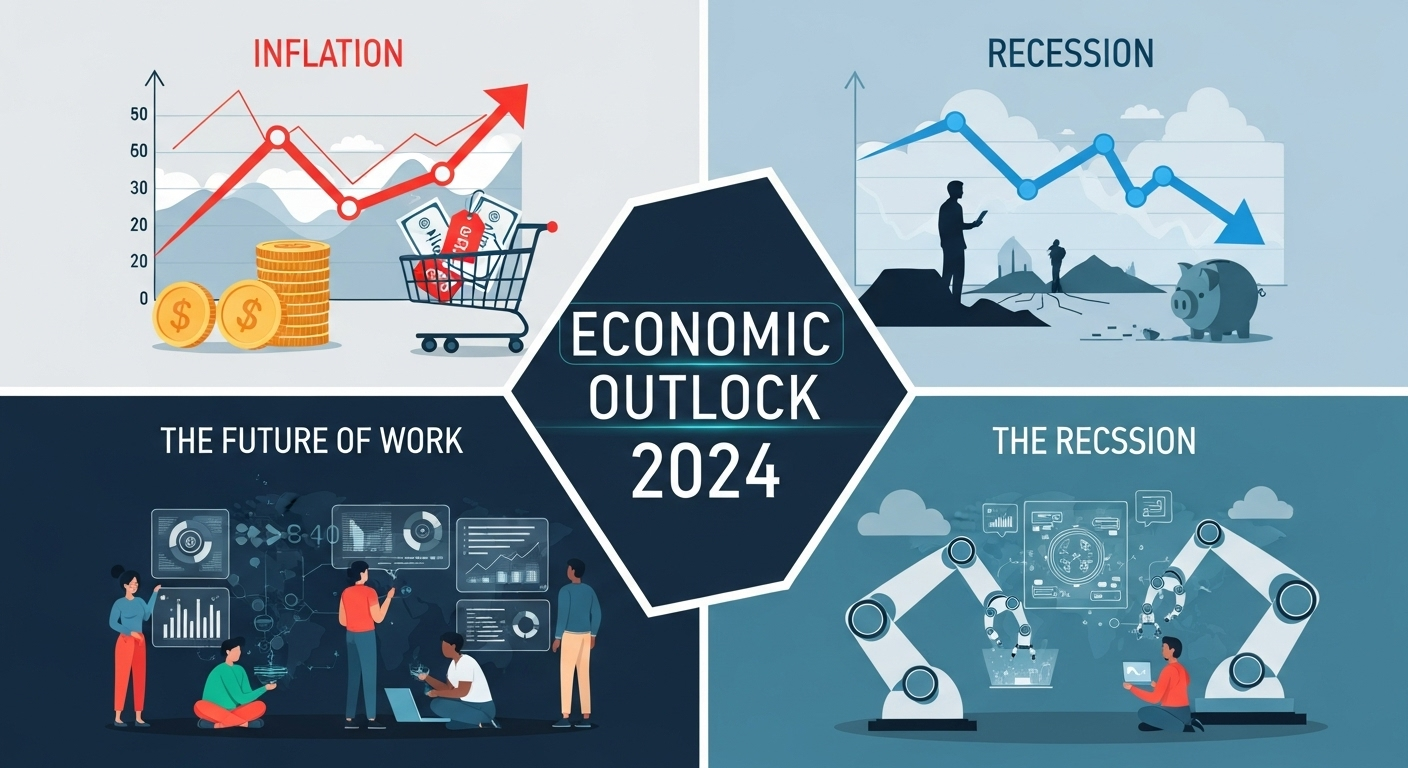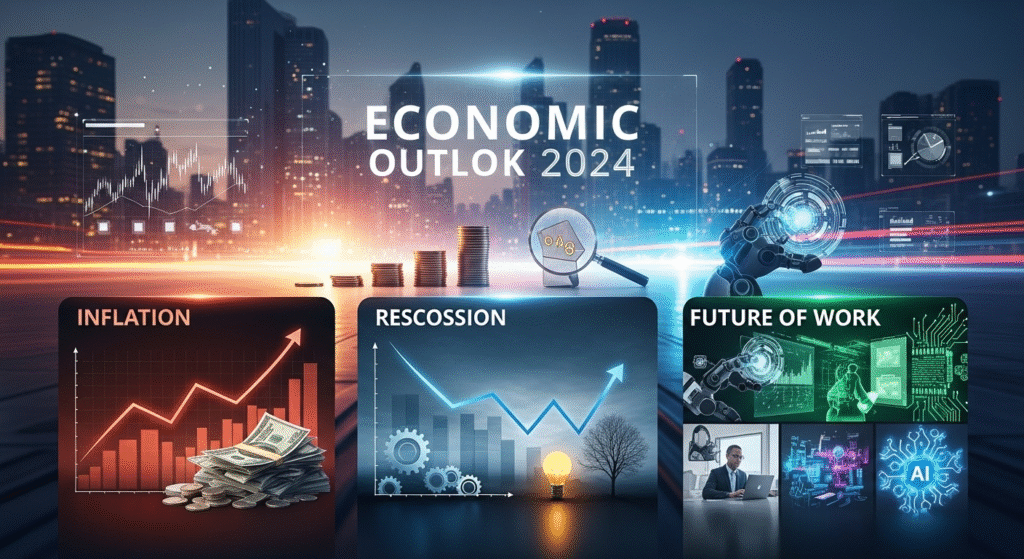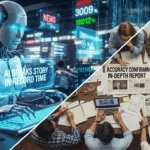Okay, so let’s talk about the elephant in the room – or rather, the herd of elephants trampling through our wallets: the economic outlook for 2024. Inflation, recession, the future of work… it’s a cocktail of anxieties served extra strong. And honestly? Some days, it feels like we’re all just trying to navigate this with a slightly outdated map and a whole lot of caffeine.
I’ve got to admit, this stuff fascinates me. Not in a detached, academic way, but in a “how’s this actually going to affect my life?” kind of way. Because let’s face it, economic trends aren’t just abstract numbers on a spreadsheet. They’re the reason your grocery bill keeps climbing, the reason your job might feel a little less secure, and the reason you’re maybe putting off that vacation (again!).
The frustrating thing about predicting the future? Well, it’s the future. It’s inherently unknowable, no matter how many fancy models you build. Still, let’s dive in, shall we? We can look at some of the factors that are going to shape the next year, and maybe, just maybe, feel a little less like we’re wandering in the dark.
Inflation: Still the Headline Act?

Inflation, that pesky gremlin that eats away at your purchasing power. We’ve been dealing with it for a while now, and while it’s cooled off from its peak, it’s still hanging around like that one guest who doesn’t know when to leave the party. The Federal Reserve has been trying to tame it with interest rate hikes. The idea? Make borrowing more expensive, which in turn slows down spending and cools down the economy. But the question is, will it work without triggering a full-blown recession? That’s the million-dollar question, isn’t it?
And here’s the thing: inflation isn’t just one monolithic beast. It’s made up of a bunch of different components. Some of it’s driven by supply chain issues (remember those?). Some of it’s driven by demand. And some of it, frankly, is driven by good old-fashioned corporate greed. Untangling all of that is incredibly complex.
Recession Watch: Are We There Yet?
Speaking of recessions, that word has been thrown around so much lately it’s lost almost all meaning. Are we heading for one? Are we already in one? Are we going to avoid one altogether? The truth is, nobody really knows for sure. The economic indicators are flashing mixed signals. Some suggest a slowdown is inevitable. Others suggest that the economy is more resilient than we think.
But consider this: even if we do technically enter a recession, it might not be the kind of catastrophic recession that we’ve seen in the past. It might be a milder, more manageable one. Or it might not happen at all! The economy is an incredibly complex beast, and predicting its movements is more art than science. But, Stablecoins will facilitate international payments
The Future of Work: More Change Than Ever
Now, let’s pivot to something I find incredibly exciting: the future of work. Because, let’s be honest, the way we work has been changing dramatically over the past few years, and that’s not going to stop anytime soon. Remote work, hybrid models, the rise of the gig economy – it’s all reshaping the landscape in profound ways.
And then, of course, there’s AI. Everyone’s talking about AI, and for good reason. It has the potential to automate a lot of tasks that are currently done by humans. And while that might sound scary, it also presents some incredible opportunities. It could free us up to focus on more creative, strategic work. It could make us more productive. It could even lead to shorter workweeks and more time for leisure! (Okay, maybe I’m getting a little too optimistic here, but a guy can dream, right?)
But here’s the thing: the future of work isn’t just about technology. It’s also about culture. It’s about creating workplaces that are more inclusive, more equitable, and more supportive of employees’ well-being. It’s about recognizing that people are more than just cogs in a machine. They’re human beings with lives, families, and passions. Let’s visit one of our sponsor page for more information: Amazon CloudFront simplifies the delivery and security of the web application with a new user-friendly interface
Navigating Uncertainty: Tips for 2024
So, what does all this mean for you? How can you navigate the uncertainty of the economic outlook in 2024? Well, here are a few thoughts:
- Be prepared for anything. Don’t assume that things are going to stay the same. Be ready to adapt to changing circumstances.
- Invest in yourself. Learn new skills. Stay up-to-date on the latest trends in your industry. The more valuable you are, the more secure you’ll be.
- Build a strong network. Connect with people in your field. Share ideas. Support each other. A strong network can be a lifeline in tough times.
- Don’t panic. The economy goes through cycles. There will be ups and downs. Don’t make rash decisions based on fear.
FAQ: Economic Outlook 2024 – Your Burning Questions Answered
Let’s address some common questions about the 2024 Economic Outlook, touching on inflation, recession fears, and the evolving world of work:
How worried should I really be about a recession in 2024?
Honestly? It’s wise to be prepared, not panicked. Economic forecasts are notoriously unreliable, and fear-mongering headlines don’t help. Focus on what you can control: your budget, your skills, your network. A recession might happen, it might not, and it might not be as bad as some predict. So, instead of obsessing, take practical steps to strengthen your financial position.
Why does inflation seem to affect some things more than others?
That’s a great question! It’s because inflation isn’t a uniform phenomenon. Some goods and services are more sensitive to supply chain disruptions, demand surges, or geopolitical events. For example, energy prices can be highly volatile, impacting transportation and manufacturing costs. Also, some companies have more pricing power than others, meaning they can pass on cost increases more easily. This is important for understanding the Economic Outlook 2024: Inflation, Recession, and the Future of Work.
Is it too late to switch careers to something more “future-proof”?
Absolutely not! It’s never too late to learn new skills or pursue a different path. In fact, the rapidly changing job market makes continuous learning more important than ever. Think about your interests, your strengths, and the areas where you see long-term growth potential. And don’t be afraid to experiment. Take a class, try a side project, or network with people in the field you’re interested in. Remember, the future of work favors adaptability and lifelong learning. For some gaming related information, you might want to check this website: Crazy Games
How do I even begin to prepare for the AI revolution at work?
Don’t think of AI as a job-stealing monster! Instead, see it as a tool that can augment your abilities. Focus on developing skills that are difficult for AI to replicate, such as critical thinking, creativity, emotional intelligence, and complex problem-solving. Also, embrace lifelong learning. Stay curious, experiment with new technologies, and be willing to adapt to changing roles. After all, human expertise will still be needed to create the best AI. According to Bank for International Settlements, understanding how global economy works is important.
So, there you have it. The economic outlook for 2024 is uncertain, complex, and a little bit scary. But it’s also full of opportunities. By staying informed, being prepared, and focusing on what you can control, you can navigate the challenges and thrive in the years to come. Now, if you’ll excuse me, I need another cup of coffee.



